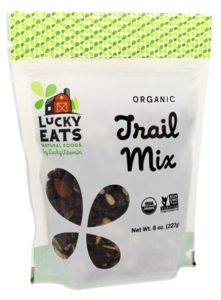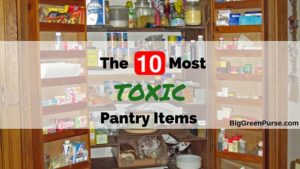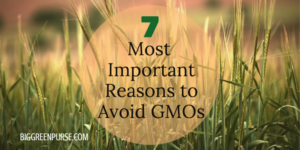Clean out your fridge.
 But before you toss all the expired or rotted food you find into the trash can, put it on your counter. Now do a rough calculation of how much that ‘trash’ cost you. Don’t be surprised if it amounts to as much as 30% of your weekly household budget. According to the U.S. Department of Agriculture, consumers on average throw away $30 of every $100 they spend – simply by forgetting to eat what they buy. In this economy, that’s a lot of money for anyone. But it’s especially painful for people who want to buy organic food and feel like they can’t afford to pay the premium it costs.
But before you toss all the expired or rotted food you find into the trash can, put it on your counter. Now do a rough calculation of how much that ‘trash’ cost you. Don’t be surprised if it amounts to as much as 30% of your weekly household budget. According to the U.S. Department of Agriculture, consumers on average throw away $30 of every $100 they spend – simply by forgetting to eat what they buy. In this economy, that’s a lot of money for anyone. But it’s especially painful for people who want to buy organic food and feel like they can’t afford to pay the premium it costs.
They can. Here’s how.
* Shop from a list you make in advance. Generate your shopping list from recipes you’re likely to cook during the week. You’ll buy fewer ingredients overall, but have the ingredients you need, and cook what you buy so you waste less.
* Avoid impulse buys. That fancy mustard on those cute crackers they’re handing out as you shop? If you’re like me, you’ll get the mustard home, slide it on a shelf, and forget about it until you rediscover it months (years?) from now, looking and tasting far less delectable than when you saw it in the store.
* Keep track of what’s in your refrigerator. One easy way: put your shopping list (or a list of the week’s recipes) on the front of the refrigerator when you get home. It will remind you what you’ve bought and what’s available inside to cook.
* Make a budget. Before you go shopping, figure out how much money you want to spend, and what “extras” you can afford, including organic food. Note that, in addition to spending the money you’ve “saved” by throwing away less food, you can shift spending from items like bottled water to organic milk, or throwaway paper towels to a reusable sponge.
* Take leftovers for lunch. Invest in a set of reusable containers you can pack with leftovers for work or school.
* Schedule leftovers for the same night every week. In my house, that night is usually Friday night, since I go grocery shopping Saturday morning. There’s always enough food left over from previous meals to pull together a small feast. And the empty refrigerator that results not only inspires me to think ahead to next week’s meals. It’s much easier to clean!
* Make stock; freeze vegetables and meat. If you’re unlikely to eat leftovers in the same week you cook them, freeze them in lunch-size portions for future consumption. Toss vegetables that are still good but just past their prime into a stock pot to make a rich base for future soups and stews.


















6 thoughts on “Here’s How You Can Afford to Spend 30% More on Organic Food”
This is absolutely true. Eliminate food waste and use the money to go organic. Brilliant idea!
Hi Diana,
What a brilliant blog post – as an advocate of both organic food AND reducing landfill waste, you make some excellent points about viewing leftovers as ingredients. This is something I feel passionately about.
Just this week I found a sprouting onion, some wilting broccoli and some cheese that had gone hard around the edges. Half an hour later, we were eating delicious soup that my husband was convinced was one of those ‘posh expensive soups’
Those kind of spontaneous cooking sessions are great for flexing the creativity muscle and often bring forth wonderful new recipes.
I wrote about reducing food waste on our site, and it’s been a very popular topic. I hope it will be of interest to some of your readers too. Most of the ideas are similar to yours (great minds 😉 ) but there are a couple of extras such as not shopping when you’re hungry (hands up everyone who is guilty of that LOL!):
http://myzerowaste.com/articles/food/how-to-reduce-food-waste/
keep up the great work; I’m loving your down to earth writing 🙂
All respect,
Mrs Green
Oh yay! I am so thrilled to have found your blog! I am a mom who is on a green mission and I have been really trying to do lots of the things you mention here to afford this lifestyle! I appreciate these wonderfulk reminders though 🙂 Our son has had severe food intolerances and Eczema since he was a baby and we have really learned how important it is to consume healthy foods and eliminate junk processed stuff. Fortunately, he has really been helped with his Vidazorb probiotics…answer to prayer…but we have now began a new journey from what we have learned through all of this. smilinggreenmom (tweet me!)
Great post. I am the author of Everything Changes: The Insider’s Guide to Cancer in Your 20s and 30s. Young adults living with chronic illness are often in the bind of wanting healthier lifestyles but not being able to afford them with entry level job income and stacks of medical bills. Your tips are fantastic. I’ll be sure to share your work with my readers!
Best,
Kairol
blog http://everythingchangesbook.com/
It is a really helpful information about organic foods. I live in a village which is a small and and isolated place.
We are 120 km far from the nearest city and as a result we produce our own food. While doing that we use extreme caution
of our food to be organic so every information about organic is very important for me, thanks to the authors here.I also
found another useful guide for organic food and also so many other things about agriculturing, i recommend this
site to everyone who wants to learn useful informations.
http://agricultureguide.org/
Thank you so much for sharing your story, and the link. Good luck in your efforts to grown all your own food – that is so ambitious, and challenging, I’m sure.